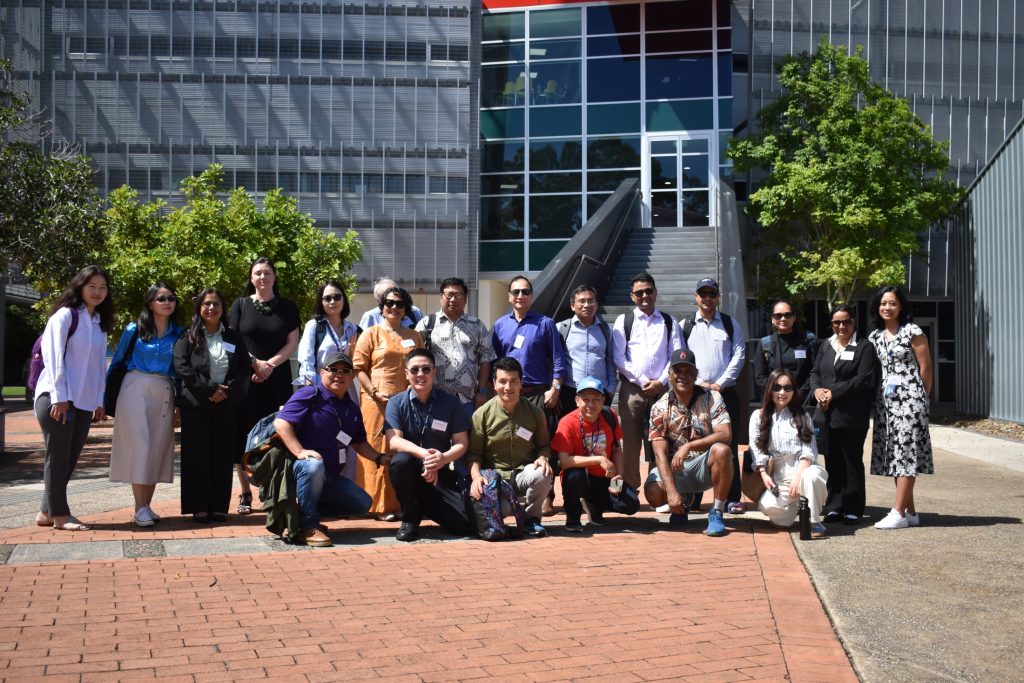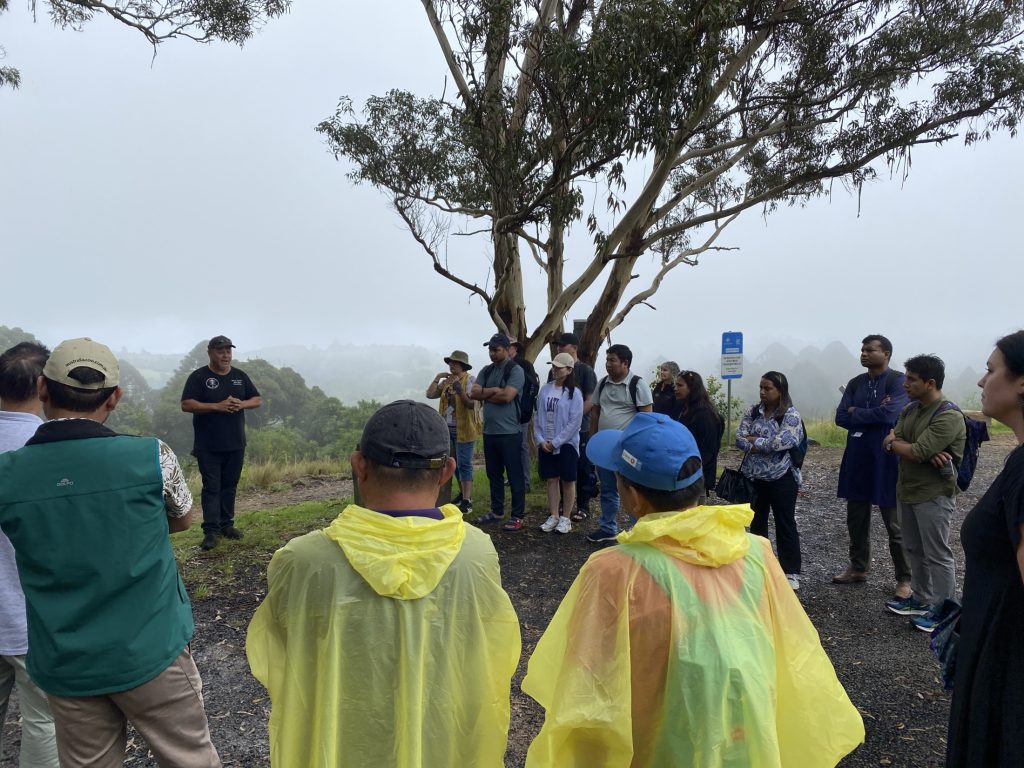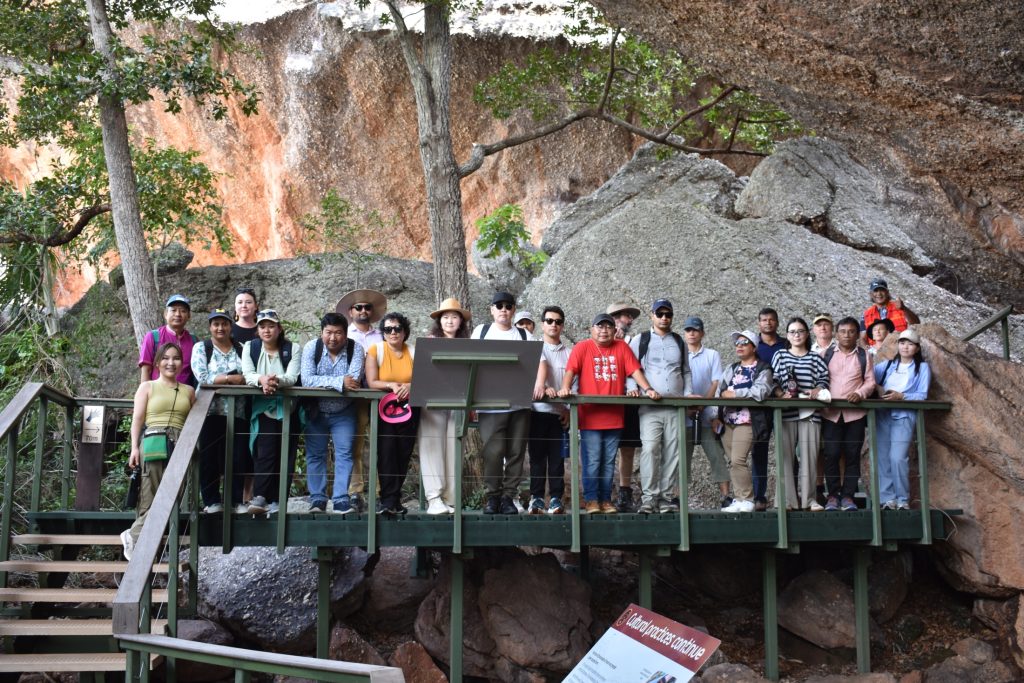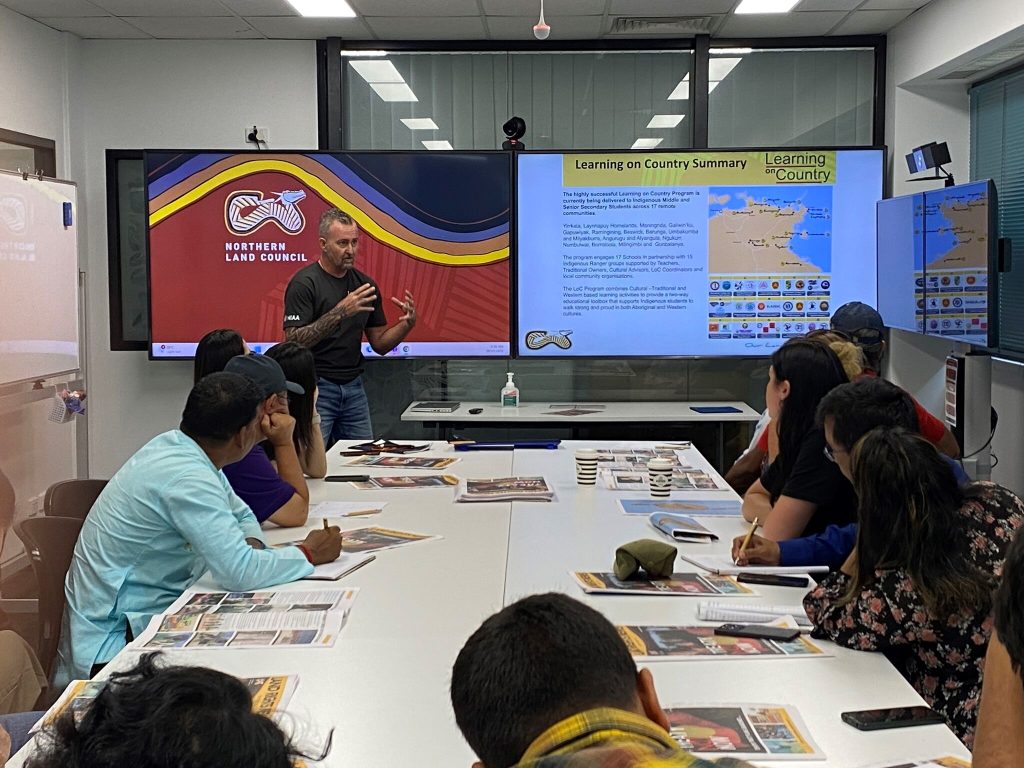Short Course participants explore Indigenous Australians’ environmental knowledge
Posted: 4 August 2025
Ahead of the 2025 International Day of the World’s Indigenous Peoples, we recognise that Aboriginal and Torres Strait Islander people have sustainably managed and maintained the land and sea for over 65,000 years.
Fifteen participants from Nepal, Bangladesh and Mongolia had the opportunity to explore Australian Indigenous environmental management and conservation practices first-hand through the Australia Awards Short Course on Regional Indigenous Environmental Knowledge, delivered by the University of the Sunshine Coast.
As part of the Short Course, participants travelled to Australia for a program of workshops, field visits and interactive sessions with Indigenous community members. Participants had the chance to engage directly with Indigenous knowledge holders and community leaders, facilitating a meaningful understanding of Indigenous perspectives on environmental management and conservation.

Participants pictured with Alice Tamang, Australia Awards – South Asia & Mongolia’s Indigenous Engagement Adviser (back row, fourth from left) who are welcomed at the University of the Sunshine Coast.
The purpose of this Short Course was to equip participants with the knowledge, skills and tools needed to support and enhance environmental conservation work in their home countries. It also aimed to facilitate a deep understanding of Indigenous perspectives on environmental management and conservation.
Highlights of the program in Australia, included a visiting the Bunya Mountains in Queensland, where participants learnt from the Bunya Peoples Aboriginal Corporation Rangers about traditional ecological knowledge and sustainable land management practices, refining their understanding of Indigenous approaches to biodiversity, fire management, and cultural stewardship.

Participants visiting Bunya Mountains, where they learnt about traditional ecological knowledge and sustainable land management practices.
Participants also joined field-based sessions on the Sunshine Coast led by a Kabi Kabi Custodian, exploring Noosa National Park, the Kabi Kabi Nature Walk, and the Noosa Everglades. They learnt about Indigenous land management practices, cultural values, and approaches to coastal erosion, habitat change, and water conservation. The sessions highlighted how traditional knowledge can support sustainable development and policy planning.
They also visited Kakadu National Park in the Northern Territory to learn about Aboriginal culture and environmental management. They viewed ancient rock art at Nourlangie, joined a wildlife and waterway-focused cruise in Yellow Water Billabong, and explored conservation efforts at the Bowali Visitor Centre. The experience offered practical insights into sustainable land management and the role of Indigenous communities in protecting Country to incorporate these teachings into their own environmental and policy contexts.

Participants visiting Kakadu National Park to learn about Aboriginal culture and environmental management.
The in-Australia component of the Short Course concluded with dynamic networking visits that developed participants’ understanding of Indigenous-led environmental efforts. At the Northern Land Council, they explored advocacy for land rights and sustainable land and sea management in the Northern Territory. A visit to the Indigenous Carbon Industry Network in Darwin showcased how Indigenous communities are shaping carbon offset projects and conservation through traditional knowledge and innovation.
Following their return, during the Applied Learning Activities component of the Short Course, participants shared updates on their progress in implementing their Return-to-Work Plans, presented outcomes and impacts individually, and took part in collaborative discussions to address common challenges. These peer exchanges fostered continued learning and mutual support, while tailored guidance helped participants refine and improve their Return-to-Work Plans for greater effectiveness and sustainability.

Participants pictured at the Northern Land Council learning about sustainable land and sea management in the Northern Territory.
Speaking of the experience gained from the Short Course, participant Hla Shing Nue from Bangladesh said, “This course opened my eyes to the power of Indigenous knowledge in shaping sustainable environmental practices. Hearing stories from across the region made me realise that although we come from different places, our traditions carry the same deep-rooted wisdom.”
Nepali participant Lasata Joshi added, “Rooted in resilience, this course invited deep reflection on how Indigenous people sustain culture and land connection through a decolonial lens. Storytelling, ceremonies and lived experiences deeply moved me, prompting reflection on my own cultural roots (as Newar, one of Nepal’s indigenous groups). I felt inspired by connections with amazing people from Australia, Bangladesh, Mongolia and Nepal, and carry forward a renewed sense of land, identity and belonging.”
Participant Tsend-Ayush Danzan from Mongolia said, “As a local government official, the Indigenous Environmental Management Short Course highlighted the critical role that Indigenous knowledge and community leadership play in sustainable environmental stewardship. I realised the need for our policies and programs to be more inclusive of traditional ecological knowledge and culturally grounded practices. Strengthening partnerships with Indigenous communities not only enhances environmental outcomes but also builds trust, resilience and local ownership over natural resource management.”
Nepali participant Dipendra Lama added, “The course significantly enriched my personal and professional development. Insights from Australia’s lived experiences, along with connections with peers from Bangladesh, Mongolia, and Nepal, broadened my worldview and deepened my respect for people, land, and nature. It reinforced my sense of responsibility and aligned with my cultural identity and commitment to inclusive, holistic environmental conservation.”